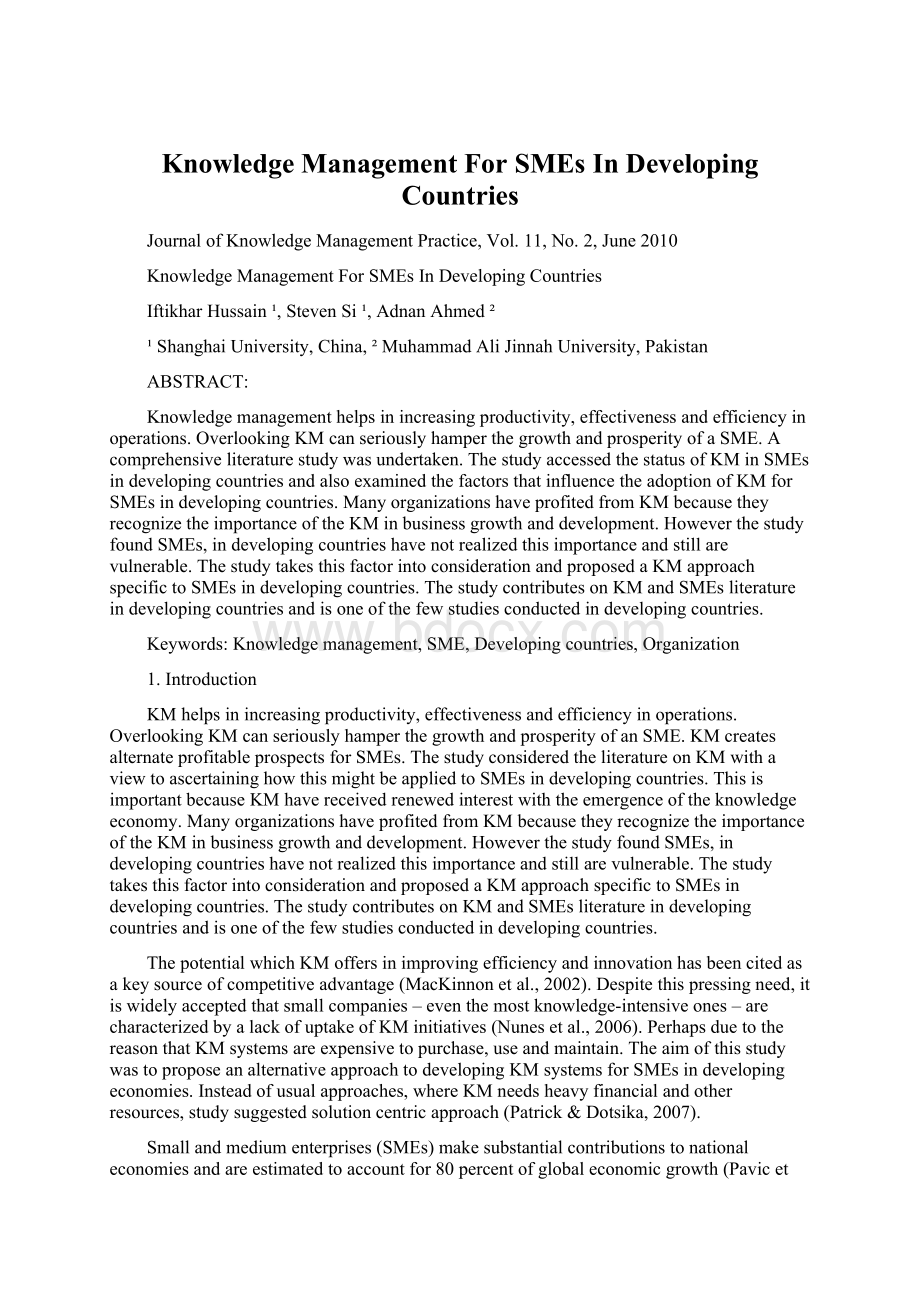Knowledge Management For SMEs In Developing CountriesWord下载.docx
《Knowledge Management For SMEs In Developing CountriesWord下载.docx》由会员分享,可在线阅读,更多相关《Knowledge Management For SMEs In Developing CountriesWord下载.docx(10页珍藏版)》请在冰豆网上搜索。

,AdnanAhmed²
¹
ShanghaiUniversity,China,²
MuhammadAliJinnahUniversity,Pakistan
ABSTRACT:
Knowledgemanagementhelpsinincreasingproductivity,effectivenessandefficiencyinoperations.OverlookingKMcanseriouslyhamperthegrowthandprosperityofaSME.Acomprehensiveliteraturestudywasundertaken.ThestudyaccessedthestatusofKMinSMEsindevelopingcountriesandalsoexaminedthefactorsthatinfluencetheadoptionofKMforSMEsindevelopingcountries.ManyorganizationshaveprofitedfromKMbecausetheyrecognizetheimportanceoftheKMinbusinessgrowthanddevelopment.HoweverthestudyfoundSMEs,indevelopingcountrieshavenotrealizedthisimportanceandstillarevulnerable.ThestudytakesthisfactorintoconsiderationandproposedaKMapproachspecifictoSMEsindevelopingcountries.ThestudycontributesonKMandSMEsliteratureindevelopingcountriesandisoneofthefewstudiesconductedindevelopingcountries.
Keywords:
Knowledgemanagement,SME,Developingcountries,Organization
1.Introduction
KMhelpsinincreasingproductivity,effectivenessandefficiencyinoperations.OverlookingKMcanseriouslyhamperthegrowthandprosperityofanSME.KMcreatesalternateprofitableprospectsforSMEs.ThestudyconsideredtheliteratureonKMwithaviewtoascertaininghowthismightbeappliedtoSMEsindevelopingcountries.ThisisimportantbecauseKMhavereceivedrenewedinterestwiththeemergenceoftheknowledgeeconomy.ManyorganizationshaveprofitedfromKMbecausetheyrecognizetheimportanceoftheKMinbusinessgrowthanddevelopment.HoweverthestudyfoundSMEs,indevelopingcountrieshavenotrealizedthisimportanceandstillarevulnerable.ThestudytakesthisfactorintoconsiderationandproposedaKMapproachspecifictoSMEsindevelopingcountries.ThestudycontributesonKMandSMEsliteratureindevelopingcountriesandisoneofthefewstudiesconductedindevelopingcountries.
ThepotentialwhichKMoffersinimprovingefficiencyandinnovationhasbeencitedasakeysourceofcompetitiveadvantage(MacKinnonetal.,2002).Despitethispressingneed,itiswidelyacceptedthatsmallcompanies–eventhemostknowledge-intensiveones–arecharacterizedbyalackofuptakeofKMinitiatives(Nunesetal.,2006).PerhapsduetothereasonthatKMsystemsareexpensivetopurchase,useandmaintain.TheaimofthisstudywastoproposeanalternativeapproachtodevelopingKMsystemsforSMEsindevelopingeconomies.Insteadofusualapproaches,whereKMneedsheavyfinancialandotherresources,studysuggestedsolutioncentricapproach(Patrick&
Dotsika,2007).
Smallandmediumenterprises(SMEs)makesubstantialcontributionstonationaleconomiesandareestimatedtoaccountfor80percentofglobaleconomicgrowth(Pavicetal.,2007).Todaythebusinessenvironmenthasbecomemorecompetitivethaneverbefore.Inthiscompetitiveenvironmentknowledgeisthoughttobetheprimaryresource.Theconventionalfactorsofproductionhavebecomesecondary.Itisstraightforwardtoobtainthem,providedthereisknowledge(Chenetal.,2006).DavidsonandGriffin(2003)pointedoutsmallbusinesseshavecontributedmanyinnovativeideasandtechnologicalbreakthroughstooursociety.InordertomaintainanddevelopfurthertheirinnovativeskillsSMEsneedtodeveloptheirunderstandingofknowledgemanagement(KM),asakeybusinessdriverratherthanasaresource-intensiveadditionalinitiative(Zanjanietal.,2008).“KMhasbecomethelateststrategyinincreasingorganizationalcompetitiveness”(DeTienne&
Jackson,2001).ThecriticalassumptionofKMisthatorganizationsthatmanageorganizationalandindividualknowledgebetterwilldealmoresuccessfullywiththechallengesofthenewbusinessenvironment.KMisseenasavitalfactorinrealizingandsustainingorganizationalsuccessforimprovedefficiencyandinnovation.Today,knowledgeistheprimarysourceofcompetitiveadvantageandthekeytosuccessfororganizationsintheknowledgeeconomy(MacKinnonetal.,2002;
Patriotta,2003).ThisstudyanalyzeddifferentaspectsofKMwithrespecttodevelopingcountriesandproposedstrategiesforbetterimplementationofKMprogramsindevelopingcountries.
Thestudyconsistsofsixsections.Followingintroduction,section2containsliteratureaboutknowledge,KM,SMEs,andKM&
SMEs.Section3discussedtheroleofSMEsindevelopingcountriesandtheneedforKMinSMEs.Section4highlightedthebenefitsofKMforSMEsandsection5containstheresearchfindings.Section6concludesthepaperandprovidesfutureresearchdirections.
2.LiteratureReview
2.1.Knowledge
Knowledgehasbeendefinedinmultipleways.DavenportandPrusak(1988)definedknowledgeasfollows:
‘Knowledgeisafluidmixofframedexperience,values,contextualinformation,andexpertinsightthatprovidesaframeworkforevaluatingandincorporatingnewexperiencesandinformation.Itoriginatesandisappliedinthemindsofknower.Inorganizations,itisoftenbecomesembeddednotonlyindocumentsorrepositoriesbutalsoinorganizationalroutines,processes,practices,andnorms.’Knowledgeistheprimaryresourceforindividuals,organizationsandtheeconomy.Delahaye(2003)concludedthatknowledgeisadistinctivesourceasithasnolawofdiminishingreturns,growsfromsharing.Wiig(1997)arguedthatknowledgeisnotanewconcept,fromveryearlytimespeoplehavetransferredknowledgebysuccessiontothenextgeneration.Inancientcultures,thishastakentheformofnarrativesandsongs,whichwereintendedtoteachthenewgenerationnewskillsandsurvivaltechniques.
Samuel(1775)wroteinhisearlydictionary"
Knowledgeisoftwokinds:
weknowasubjectourselves,orweknowwherewecanfindinformationuponit”.Knowledgecanbedividedintotwocategories:
tacitandexplicit.Explicitknowledgereferstotheknowledgewhichcanbearticulatedinformallanguagesuchasgrammaticalstatements,mathematicalexpressions,specifications,manuals,andthuscanbetransmittedacrossindividualsformallyandeasily.Onthecontrary,tacitknowledgereferstotheknowledgewhichishardtoarticulatewithformallanguage,butispersonalknowledgeembeddedinindividualexperienceandinvolvesintangiblefactorssuchaspersonalbelief,perspective,andvaluesystems(David,2006;
Nonaka&
Takeuchi,1995).
2.2.KnowledgeManagement
KMinvolvesknowledgeidentification,creation,acquisition,transfer,sharingandexploitation.KMisvitalforefficiencyandorganizationalcompetitiveness(Egbu,2001).Boh(2007)describedthatKMisasystematicprocessforacquiring,organizing,sustaining,applying,sharingandrenewingboththetacitandexplicitknowledgeofemployeestoenhanceorganizationalperformanceandcreatevalue.Menkhoffetal.,(2002)definedKMasthetaskofdevelopingandexploitingbothtangibleandintangibleknowledgeresourcesofanorganization.Pillania(2006c)definedKMas“asystematic,organized,explicitanddeliberateongoingprocessofcreating,disseminating,applying,renewingandupdatingtheknowledgeforachievingorganizationalobjectives'
'
.KMisaprocesswhichinvolvesthemanagementofexplicitandtacitknowledge(Nonaka&
Takeuchi,1995).
2.3.SMEsAndTheirRoleInDevelopingCountries
AccordingtoOECD(2000)SMEsmake-upthelargestproportionofbusinessesallovertheworldandplaytremendousrolesinemploymentgeneration,provisionofgoodsandservices,creatingabetterstandardofliving,aswellasimmenselycontributingtothegrossdomesticproducts(GDPs)ofmanycountries.TheEuropeanCommissiongaverisetothetermSMEin1996anddefinedthetermasorganizationsemployingfewerthan250people(Burns,2001).Indevelopingcountries,SMEsaredefineddifferentlyforvariouscountries.ThetermSMEcoversaheterogeneousgroupofbusinessesinadevelopingeconomy,rangingfromasingleartisanworkinginasmallshopmakinghandicraftsforavillagemarkettosophisticatedengineeringfirmssellinginoverseasmarkets(Fischer&
Reuber,2003).GenerallySMEsindevelopingcountrieshavenotmorethan250employees.SomeimportantcharacteristicsofSMEsinclude:
Ø
Thecompanyischaracterizedbytheentrepreneurwhoveryoftenalsoistheownerofthecompany.
Theentrepreneurnormallyisthe“generalmanager”,thusheactsonhisownrisk.
Theentrepreneurhasanetworkofpersonalcontactstocustomers,suppliersandtherelevantpublicsector.Sothecontactiscloseandratherinformal.
Thecompanyusuallyactsverylocal.
Theproductsofferedcanbeveryindividualtothecustomer’sneeds.
Theformoforganizationisratherinformalandflat.
Thecompanycanreactquicklytochangesintheenvironment.
Thecompanyisnotdominatedorruledbyanothercompany,e.g.partofbigbusinessconcern.
Themarketshareisnormallysmall.
Theproductsarelittlediversified.
About36%oftheSMEsarenotolderthan10years(specificdevelopmentstage).
SMEsarethebackboneoftheindustrializationprocessofmanydevelopingcountriesandplayavitalpartinexpandingacountry'
seconomy.InThailand,SMEsaccountformorethan90%ofthetotalnumberofestablishments,65percentofemploymentand47percentofmanufacturingvalueaddedwhileinPhilippines,SMEscomprise99percentofthetotalmanufacturingestablishmentsandcontribute45percentofemploymentand18percentofvalueaddedinthemanufacturingsector.AcrosstheSouthAsia,thecontributionofSMEstotheov